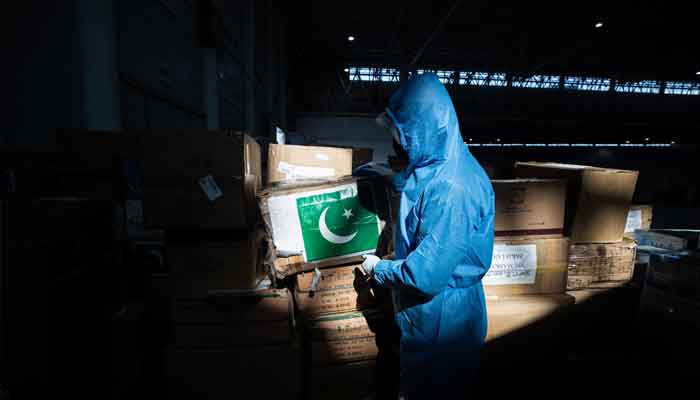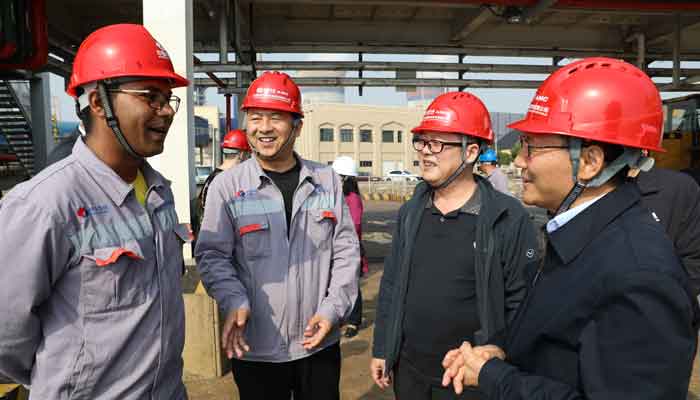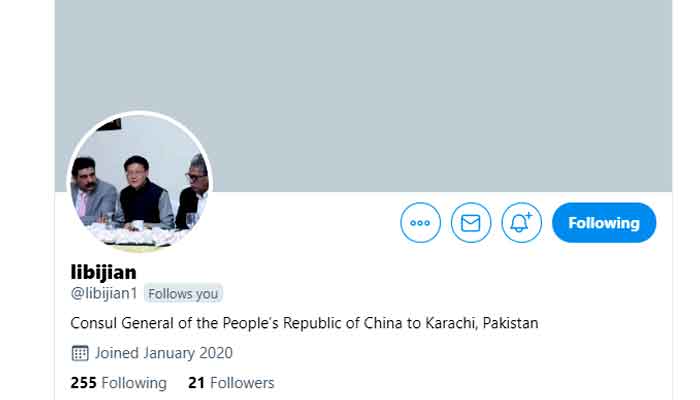From New Delhi to Karachi: This Chinese diplomat is on a mission to 'serve' Pakistanis
"From the very beginning, from my childhood, my brother and I were taught that Pakistan is our brother," says new consul general in Karachi
"When it comes to Pakistan and India, people of both the countries share a lot of similarities in terms of food, culture, sports and it is my desire that the both the nations should forget the past and live peacefully together as neighbours."
These were the words of newly appointed Chinese Consul General in Karachi Li Bijian, who, for the last five years, had been serving as deputy chief of mission at the Chinese Embassy in New Delhi.
Li, a seasoned diplomat, has vast experience working in South Asia under his belt. He served Chinese missions in Bangladesh, Afghanistan and India before arriving at the Karachi Consulate.
An avid conversationalist, Li in his interview with The News spoke about the China-Pakistan Economic Corridor (CPEC), Pakistan-India relations, the coronavirus and Pakistanis stranded in Wuhan and his mission to serve in Pakistan.
Mission to serve Pakistanis
The consul general, whose Karachi posting is his seventh, believes that a dream he once had in Bangladesh many years ago about serving in Pakistan has now come true.
“From the very beginning, from my childhood, we were taught that Pakistan is our brother and this relation has withstood the test of time and history,” Li shared.
“And, during my diplomatic career, I learnt that the phrase ‘higher than the Himalayas, deeper than the oceans, sweeter than honey’ is true in every essence,” he said.
My mission is to serve my Pakistani brothers and sisters, Li added.
“I was very happy when I received news in New Delhi that I will next have a chance to work in Pakistan. My dreams have finally come true after being appointed consul general of China to Karachi,” he said.
“Now that I’m here, I will do what I can do to bring the two nations even closer and to strengthen our bilateral relations further.”
'Let bygones be bygones'
A native of the Sichuan province, Li has a lot of love for desi cuisine.
“Before I came here, my wife and I were very curious what Karachi would be like and how life would be here,” he recalled.
“I love Pakistani food and it’s very interesting that roti, jalebi, samosa and even tandoori chicken was available, [just as] in local New Delhi restaurants,” he said while comparing popular Indian and Pakistani foods.
“And secondly I found so many similarities, the food, culture and even language,” he said. “Hindi is similar to Urdu, especially when you travel to the West of India.”
The Chinese diplomat also spoke about other aspects of the culture that he found very similar in India and Pakistan, such as a passion for cricket.
“I really enjoyed my time in India. My five-year stay there was long but very enjoyable and I tried my best to stay close with the locals.”
“I always think that no matter how many differences you have, as neighbours, you have to live together peacefully. As they say, you can choose your friends but you can never choose your neighbours because they will be there forever,” he said while referring to the tense ties between Islamabad and New Delhi.
"Some of the issues between the two countries are left over by history and they cannot be altered overnight, but we have to find some mutually acceptable solutions.”
“We have to come up with new ideas to solve problems. Let bygones be bygones. Peace and stability are very important and this is why I call upon my brothers and sisters in Pakistan and India to work together to solve problems and move forward.”
"That is my aspiration."
‘China determined to win fight against coronavirus’
Amidst the global scare over the deadly coronavirus, which has killed more than 800 and spread to over 30 other countries and regions outside mainland China, Beijing firmly believes it can win the battle over the deadly virus.
The flu-like virus, which was first identified in Hubei province's capital, Wuhan has infected over 37,000 people in mainland China. The province has been in virtual lockdown for nearly three weeks, with its train stations and airports shut and its roads sealed off.
“The steps taken by the central government in order to contain the transmission of this virus have been successful,” says Li. “President Xi Jinping and Premier Li Keqiang are directly supervising the whole campaign, which shows the country’s commitment and seriousness.”
Acknowledging initial lapses in supplies of medical goods, the consul general explained that due to the Spring Festival, the production of necessary equipment, including masks and gloves, could not be started in time.
“The decision to quarantine Wuhan and restriction on free movement across cities has [since] proven correct,” remarked Li.
“Because by doing so, we have cut off the transmission [of virus] from one part to another and this has been very effective. The strict measures taken in metropolitan cities like Shanghai and Beijing and other cities have shown good results.”
A team of scientists mandated by the government to find a cure and develop a vaccine for the prevention has made “some progress”, he added.
The consul general further shared that there were some reports suggesting that traditional Chinese medicine was found to be effective against the virus.
“People across China are determined to come up with strong measures to control and fight this virus and I am confident that eventually, we will win this battle,” said Li.
“The people of Wuhan have made sacrifices to save the world.”
‘Pakistanis should not be evacuated from Wuhan’
Soon after the lockdown in Wuhan to stop the spread of the virus, families of Pakistani students in the country, in a state of worry, had demanded that the Pakistani government evacuate the students from China.
The students posted videos on social media and pleaded with the authorities in Islamabad to evacuate them just as other countries were doing for their citizens. The Pakistani government, however, decided against it.
Endorsing the stance of the Pakistani government, Li said that, considering the available health facilities in the country and equipment needed to treat and monitor the affected persons, it was the correct decision to not bring them back.
Initially, the diplomat admitted, there were some problems with regards to the provision of healthcare and other facilities for Pakistani students in the city and that “they were in a panic, which was understandable”.
“After we received information from the embassy, the concerned authorities were directed to look into this matter and take immediate action to provide whatever was required by the students and to make sure of the provision of halal food and to ensure that they are staying in their dorms safely,” he added.
Li further shared that Pakistanis across China were receiving special treatment from local governments and some Pakistanis were even “participating and providing professional help and assistance to Chinese patients.”
“We have been trying our best to provide equipment and shelters and everything to them to make sure their stay in China is safe and comfortable,” Li added.
He also lauded the efforts of Pakistani officials to help their countrymen.
‘CPEC not a debt trap’
Speaking about accusations levelled by the West about CPEC being a “colonial tool and a debt trap,” the consul general strongly rejected the perception and termed these allegations as “groundless”.
“I must say that CPEC has made great achievements and brought actual benefits to Pakistan,” said Li, adding that CPEC’s second phase was focused on three major areas: industrialisation, agriculture and poverty alleviation.”
“Through industrialisation, the young population will get employment opportunities,” he added.
CPEC loans amount to nearly six per cent of total external debt of Pakistan, while the rest is all taken by western financial institutions, he pointed out.
“We have to guard against such baseless allegations.”
Another accusation that is often levelled is that China is using CPEC to impose colonialism. “I think that is baseless. We know very clearly what colonialism means.”
The Chinese envoy also offered Beijing’s assistance in introducing cutting-edge technologies to promote digital agriculture, saline agriculture, which would help in strengthening the value chain to increase Pakistan's agricultural output.
Highlighting the locust problem, he said China has vast experience in dealing with the pests and even offered help in eliminating it.
China’s digital diplomacy
When asked to comment on how effective has Twitter been in putting the Chinese perspective across to host countries, Li said, “the social media is an important tool of communication in the new era and an important aspect of modern life.
Li believes that instead of using social media to criticise others, it should be used to understand and accommodate others.
“We should not use this platform to criticise each other, but rather use it to share our views and help each other out.
This is why I have opened two accounts @libijian1 and @libijian2 to interact with the people.”
-
Security forces gun down 30 terrorists in multiple IBOs in KP: ISPR
-
MQM-P calls for new province in Sindh
-
US report validates Pakistan military edge over India: PM
-
Banned TTP poses serious threat to Pakistan security: UNSC panel
-
CM Afridi clarifies remarks on by-poll after ECP requests army deployment
-
Dubai sees 3.2m Pakistani passengers in 2025 as airport sets new milestone
-
Security forces kill 23 Indian proxy terrorists in KP's Kurram
-
Pakistan to construct island to boost oil exploration: report














